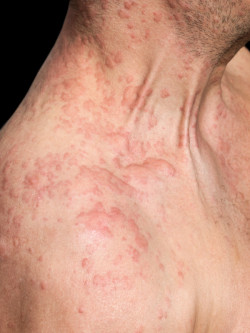 The anti-seizure medication Onfi (clobazam) is a benzodiazepine that since 1975 has been marketed to treat anxiety; since 1984 for epileptic seizures; and in 2011 the drug received U.S. Food and Drug Administration (FDA) approval as an add-on treatment for seizures associated with Lennox-Gastaut syndrome in adults and children 2 years of age and older.
The anti-seizure medication Onfi (clobazam) is a benzodiazepine that since 1975 has been marketed to treat anxiety; since 1984 for epileptic seizures; and in 2011 the drug received U.S. Food and Drug Administration (FDA) approval as an add-on treatment for seizures associated with Lennox-Gastaut syndrome in adults and children 2 years of age and older.
Lennox-Gastaut is a severe form of epilepsy which usually begins before 4 years of age.
Medical experts believe that Onfi works by enhancing the effects of a natural brain chemical which, when released, slows activity of nerve cells in the brain.
In 2012, the National Institutes of Health published an abstract stating that Clobazam (Onfi) “is a promising antiepileptic medication, given its effectiveness and relatively low rates of adverse effects” and that the drug had been studied and used in several countries for the treatment of refractory seizures that occur with Lennox-Gastaut Syndrome, which is notoriously difficult to treat and manage.
But since then the FDA has warned of Onfi side effects, and that Onfi can cause the severe and often fatal skin reactions Stevens Johnson Syndrome (SJS) and toxic epidermal necrolysis (TEN) at any time during treatment. These serious skin reactions are rare, but can cause permanent harm and may lead to death, according to an FDA drug safety communication.
Patients taking Onfi should be monitored for signs or symptoms of Stevens Johnson Syndrome and toxic epidermal necrolysis, particularly during the first eight weeks of treatment or when the drug has been stopped and then re-started.
In an FDA case series, all cases of Stevens Johnson Syndrome and toxic epidermal necrolysis resulted in hospitalization, one case in blindness, and one case resulted in death.
Classic signs of Stevens Johnson Syndrome are very painful flu-like symptoms that produce a potentially life-threatening skin disease manifested by a rash similar to a burn, open sores and skin peeling. Patients often suffer a purplish rash that spreads, painful blisters of the mucous membranes, including on the eyes, nose, mouth, and genitals, sloughing off of skin in large patches, joint and muscle pain and a burning sensation all over the body.
Toxic epidermal necrolysis (TEN) is a more deadly form of Stevens Johnson Syndrome. Up to 40 percent of people who suffer TEN die from complications associated with the painful disease. Five to 15 percent of those with Stevens Johnson syndrome (SJS) succumb to the reaction.
Survivors may experience lifelong health problems such as a secondary skin infection (cellulitis), sepsis (a blood infection), blindness, internal organ damage and permanent skin damage.
The FDA warns that Onfi patients who experience a rash or blistering or peeling skin, hives, or mouth sores immediately consult their healthcare provider, though the agency warns that Onfi should not be stopped before consulting with a healthcare provider because there is a risk of serious withdrawal issues, including seizures, hallucinations, shaking, nervousness, and stomach and muscle cramps.
Do YOU have a legal claim? Fill out the form on this page now for a free, immediate, and confidential case evaluation. The Stevens Johnson Syndrome attorneys who work with Top Class Actions will contact you if you qualify to let you know if an individual lawsuit or class action lawsuit is best for you. [In general, SJS lawsuits are filed individually by each plaintiff and are not class actions.] Hurry — statutes of limitations may apply.
ATTORNEY ADVERTISING
Top Class Actions is a Proud Member of the American Bar Association
LEGAL INFORMATION IS NOT LEGAL ADVICE
Top Class Actions Legal Statement
©2008 – 2025 Top Class Actions® LLC
Various Trademarks held by their respective owners
This website is not intended for viewing or usage by European Union citizens.
Get Help – It’s Free
Help for Victims of Onfi Stevens Johnson Syndrome
If you or a loved one were diagnosed with Stevens Johnson Syndrome (SJS) or toxic epidermal necrolysis (TEN) after taking Onfi, you may be eligible to take legal action against the drug’s manufacturer. Filing an Onfi SJS lawsuit or Onfi class action lawsuit may help you obtain compensation for medical bills, pain and suffering, and other damages. Obtain a free and confidential review of your case by filling out the form below.
An attorney will contact you if you qualify to discuss the details of your potential case at no charge to you.
Oops! We could not locate your form.












